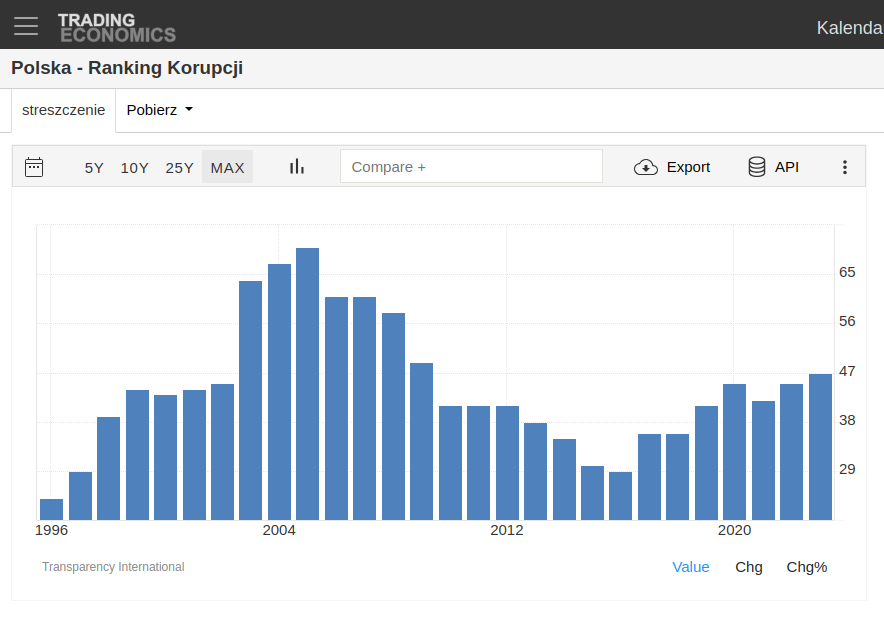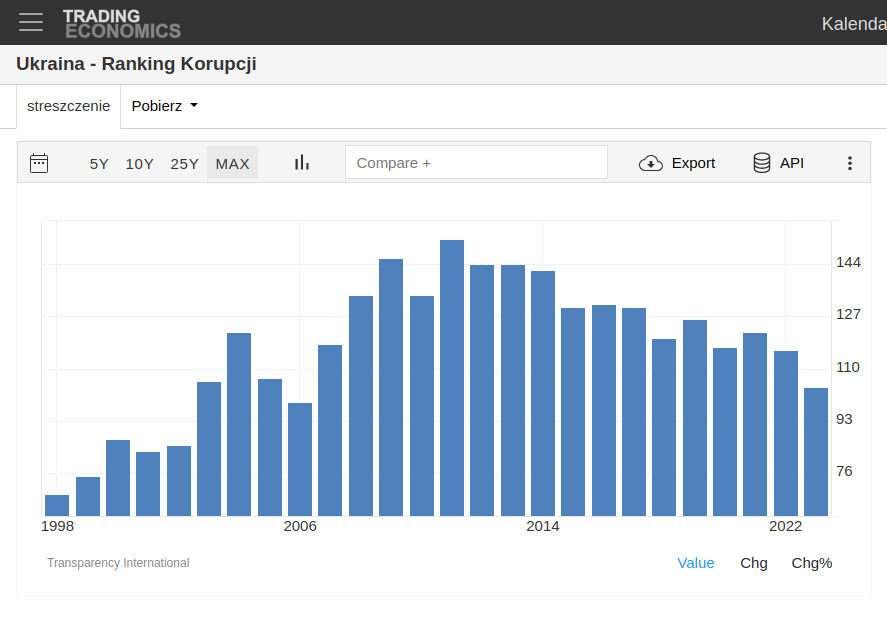kravietz 🦇 on Nostr: So everyone is talking about #corruption in #Ukraine - how does it look like on a ...
So everyone is talking about #corruption in #Ukraine - how does it look like on a bigger picture?
Let’s take Transparency International Corruption Perception Index, which measures subjective (!) perception of corruption inside each country. The less points, the worse corruption is:
Ukraine - increase from 26 (2012) to 36 (2023) with a clear upward trend
In comparison:
#Poland - decline from 56 (2012) to 54 (2023), but the best value was reached in 2015 (63 points) and the decline dates from then
Russia - decline from 28 (2012) to 26 (2023) with a clear downward trend
Summary: perception of corruption in Poland is 2x less than in Ukraine, but when compared to Russia Ukraine made huge progress and is on a clearly improving trend, while Russia is sliding back into corruption mayhem.
Note: in addition to points TI also publishes an index which is a list of all countries sorted by number of points. The meaning of index is reversed, so higher the country ranks the better, but the same data.
Comment: when talking about corruption in Ukraine, it is important to be aware that this is a country that, in terms of the rule of law, has remained in the Russian sphere of influence for much longer than Poland, which joined the EU in 2004 - nevertheless, successive governments after 2014 have done a gigantic amount of work and it is producing tangible results.
Current CPI data: https://transparency.org/en/countries/ukraine… (country can be changed on the top right)
Historical data for Poland shows that the biggest decline in corruption was just after 2004 - at that time Ukraine was deprived of this external pressure and in its case this decline is clearly delayed by about a decade and starts from about 2011.
But what happened in 2011? Well, it was the beginning of the preparations for EURO2012, i.e. the gigantic investments in infrastructure (which I remember very well, because I was driving a car across Ukraine at the time) with UEFA inspections, which also forced some reduction in corruption - in the same way that Poland was forced by ‘special laws’, which streamlined the absurdly inefficient administrative procedures.
Source: https://pl.tradingeconomics.com/ukraine/corruption-rank (note this graphs shows the index so the higher, the worse corruption)


Let’s take Transparency International Corruption Perception Index, which measures subjective (!) perception of corruption inside each country. The less points, the worse corruption is:
Ukraine - increase from 26 (2012) to 36 (2023) with a clear upward trend
In comparison:
#Poland - decline from 56 (2012) to 54 (2023), but the best value was reached in 2015 (63 points) and the decline dates from then
Russia - decline from 28 (2012) to 26 (2023) with a clear downward trend
Summary: perception of corruption in Poland is 2x less than in Ukraine, but when compared to Russia Ukraine made huge progress and is on a clearly improving trend, while Russia is sliding back into corruption mayhem.
Note: in addition to points TI also publishes an index which is a list of all countries sorted by number of points. The meaning of index is reversed, so higher the country ranks the better, but the same data.
Comment: when talking about corruption in Ukraine, it is important to be aware that this is a country that, in terms of the rule of law, has remained in the Russian sphere of influence for much longer than Poland, which joined the EU in 2004 - nevertheless, successive governments after 2014 have done a gigantic amount of work and it is producing tangible results.
Current CPI data: https://transparency.org/en/countries/ukraine… (country can be changed on the top right)
Historical data for Poland shows that the biggest decline in corruption was just after 2004 - at that time Ukraine was deprived of this external pressure and in its case this decline is clearly delayed by about a decade and starts from about 2011.
But what happened in 2011? Well, it was the beginning of the preparations for EURO2012, i.e. the gigantic investments in infrastructure (which I remember very well, because I was driving a car across Ukraine at the time) with UEFA inspections, which also forced some reduction in corruption - in the same way that Poland was forced by ‘special laws’, which streamlined the absurdly inefficient administrative procedures.
Source: https://pl.tradingeconomics.com/ukraine/corruption-rank (note this graphs shows the index so the higher, the worse corruption)


